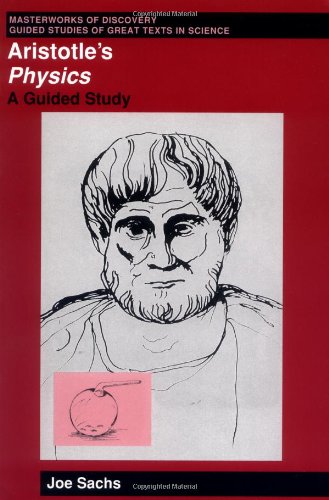Aristotle on Knowing
184a Since, in all pursuits in which there are sources or causes or elements, it is by way of our acquaintance with these that knowing and understanding come to us (for we regard ourselves as knowing each thing whenever we are acquainted with its first causes and first beginnings, even down to its elements), it is clear that also for the knowledge of nature one must first try to mark out what pertains to its sources. On the other hand, the natural road is from what is more familiar and clearer to us to what is clearer and better known by nature; for it is not the same things that are well known to us and well known simply. For 20 this reason it is necessary to lead ourselves forward in this way: from what is less clear by nature but clearer to us to what is clearer and better known by nature. But the things that are first evident and clear to us are more-so the ones that are jumbled together, but later the elements and beginnings become known to those who separate them out from these. Thus it is necessary to proceed from what is general to what is particular, for it is the whole that is better known by perceiving, and what is general is a kind of whole since it embraces many 184b things as though they were parts. Something of this same kind happens also with names in relation to their meanings, for a name too signifies some whole indistinctly, such as a circle, but the definition takes it apart into particulars. Children too at first address all men as father and women as mother, but later distinguish each of them.
Notes:
He suggests going from the general to the particular, when modern science is about going from the particulars to the general.
Folksonomies: scientific method knowledge knowing
Taxonomies:
/family and parenting/children (0.421039)
/family and parenting/children/daycare and preschool (0.388966)
/food and drink/food/grains and pasta (0.321115)
Keywords:
modern science (0.945944 (positive:0.254182)), natural road (0.868889 (positive:0.536639)), nature (0.851664 (positive:0.515841)), elements (0.656669 (negative:-0.219375)), things (0.642925 (positive:0.299334)), particulars (0.605039 (positive:0.254182)), beginnings (0.569562 (positive:0.101864)), way (0.518886 (positive:0.441418)), kind (0.487876 (positive:0.574028)), causes (0.486545 (positive:0.321239)), sources (0.485165 (positive:0.520731)), Knowing (0.422532 (neutral:0.000000)), acquaintance (0.395535 (positive:0.516991)), general (0.394060 (positive:0.254182)), perceiving (0.383447 (positive:0.344509)), Aristotle (0.382485 (neutral:0.000000)), pursuits (0.377493 (neutral:0.000000)), thing (0.359772 (positive:0.321239)), reason (0.354754 (positive:0.365845)), knowledge (0.351474 (positive:0.520731)), hand (0.348636 (neutral:0.000000)), ones (0.344942 (negative:-0.274694)), meanings (0.342720 (neutral:0.000000)), relation (0.338497 (neutral:0.000000)), parts (0.336829 (neutral:0.000000)), Children (0.336789 (neutral:0.000000)), father (0.336660 (neutral:0.000000)), address (0.336598 (neutral:0.000000)), men (0.336503 (neutral:0.000000)), women (0.336312 (neutral:0.000000))
Entities:
Aristotle:Person (0.944861 (neutral:0.000000))
Concepts:
Metaphysics (0.930258): dbpedia | freebase | opencyc
Science (0.883761): dbpedia | freebase | opencyc
Understanding (0.792404): dbpedia | freebase | opencyc
Knowledge (0.706029): dbpedia | freebase
Epistemology (0.672160): dbpedia | freebase | opencyc
Reason (0.662684): dbpedia | freebase
Plato (0.660031): dbpedia | freebase | opencyc | yago
Aristotle (0.641967): dbpedia | freebase | opencyc | yago





